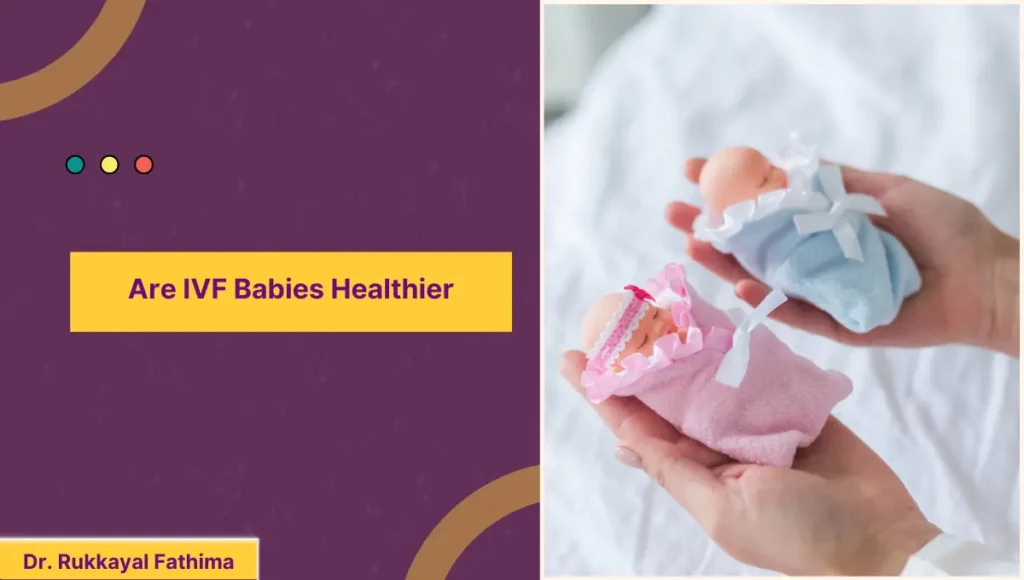IVF (in vitro fertilization) is one of the most successful fertility treatments in the world. However, there are still some concerns people have about the procedure.
Whether it is you or any other couple who is thinking of undergoing IVF, the first question that will come to mind is, “Are IVF babies as healthy as naturally conceived babies?”
This is also one of the main factors that deter couples from choosing IVF to get pregnant. So, what is the truth? Are IVF babies healthy? Are there any risks associated with IVF babies? We’ll look at all this in detail in this article.
Are IVF babies healthy?
To answer your million-dollar question, YES, IVF babies are healthy and have the same physical and mental characteristics as a natural baby.
You should understand that only the method of conception is different for both procedures. While natural fertilization happens in the fallopian tubes through sexual intercourse, IVF fertilization happens artificially in a laboratory.
Your IVF doctor will collect your eggs and sperm, fertilize them in a laboratory, and transfer the embryo into your uterus to result in pregnancy. Once the embryo implants in the uterus, your pregnancy journey will be the same as natural pregnancy.
What do the Past results say?
Though IVF babies are as healthy as natural babies, it does not mean that they do not have any defects.
According to studies, IVF babies have been found to have about one-third higher risk of developing congenital birth defects compared to natural babies. IVF babies also have a higher chance of having low birth weight and premature birth.
You should also note that these studies only state that IVF babies have higher chances of having these defects. It does not mean that the babies will definitely have those.
So, as long as the embryo quality is high and the embryos are tested for defects before embryo transfer, the chances of these risks can be reduced.
What are the Risks Associated with IVF Babies?
As mentioned above, there are some risks associated with IVF pregnancy. However, these risks can be avoided if you and your IVF doctor take the necessary steps to ensure a safe and healthy baby.
Below are some of the most common risks of IVF babies.
Birth Defect Risk
IVF babies are more susceptible to certain birth defects than their natural-born counterparts. These defects are mostly dependent on the intended parent’s age and the quality of their eggs and sperm.
Some birth defects that IVF babies may have are listed below.
- IVF babies are more prone to genetic disorders like sickle cell anemia and cystic fibrosis.
- IVF babies might have some defects in the heart or other internal organs.
- IVF babies have a higher chance of having chromosomal abnormalities like Down syndrome.
Physical and Mental Health
The chances of your IVF baby having any physical or mental health defects are very low. No studies have yet proved that IVF babies are physically and mentally poorer than natural babies.
A recent study also found that there have been no long-term defects in IVF babies as well. Their growth rate was also equal to that of any other baby. Their verbal skills and reasoning ability were also on par with natural babies.
Conclusion
IVF babies are as healthy and normal as natural-born babies. As long as your eggs and sperm are healthy and your doctor transfers the best-quality embryo during embryo transfer, your baby has a very low chance of having birth defects.
Understand that your age is an important factor in ensuring a healthy baby. So, if you wish to undergo IVF, ensure you do it when you are under 35 years old.
If you are older than that, discuss with your IVF doctor and follow precautionary measures to ensure a healthy and normal baby.
YES, IVF babies are healthy and have the same physical and mental characteristics as natural babies. Only the method of conception is different for both babies. While in natural pregnancy, fertilization happens in the fallopian tubes through sexual intercourse, IVF fertilization happens artificially in a laboratory.
Fertility doctors can conduct tests like PGS (Preimplantation Genetic Screening) to detect any chromosomal or genetic abnormalities in the embryo. They can use embryo grading to rank the embryos based on their quality and choose the one with the highest chances of success.
Though many people believe that IVF can lead to multiple pregnancies, it is actually not the case. IVF doctors do a complete analysis and choose the best one or two embryos for transfer. So, you don’t need to worry about multiple pregnancies with IVF.
Children born through IVF have a higher risk of developing some defects like heart problems, low birth weight, premature birth, and central nervous system and musculoskeletal deformities. These risks are highly dependent on the egg and sperm quality of the biological parents.





